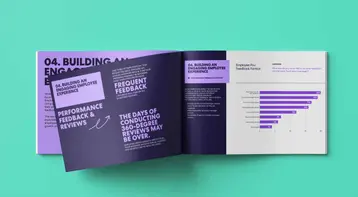
Table of contents
- 1.Personal reference and professional reference defined
- 2.When should a candidate use a personal reference?
- 3.The difference between personal and professional references
- 4.Can there be overlap between personal and professional references?
- 5.What about family members as references?
- 6.How to ask someone to be a reference
- 7.References should know a candidate well enough
When people complete a job application, they are asked to provide references. Many people are unsure whom they should use as a reference. Should the emphasis be placed on personal or professional references? Many think professional references are more critical when searching for a job. However, that isn’t necessarily the case. Personal references have their place as well. What is the difference between a personal and a professional reference, and which is more beneficial for those seeking employment?
Personal reference and professional reference defined
Reference checks give potential employers information regarding applicants that allows the employer to know more about the applicant. There are 2 kinds of references that are typically provided to the employer. One is a professional reference. Professional references are typically managers, team leaders, or coworkers that know the potential employee through a working relationship. A personal reference is someone who knows the applicant outside of work. These people can share insights into a potential employee’s life away from the job. Sometimes a personal reference and a professional reference are the same people. However, if the reference is simply a personal reference, it shouldn’t be discounted as unreliable or unworthy. Personal references can give employers valuable insight into how candidates handle situations outside the work zone. They provide information about a person’s character and life skills. Sometimes, they also have insight into a person’s work ethic, punctuality, and other valuable work skills. A personal reference is a witness to a candidate’s daily ability to plan activities, follow through, and manage their time. The reference will usually know interests, hobbies, and lifestyle information that makes a candidate a well-rounded choice for the position. The answers to questions you can ask a candidate's reference can tell you about the candidate's ability to work with others, and their values, work ethic, skill sets outside of work, and personality traits from personal references.
While professional references give insight into a person’s ability to handle job-related tasks, a personal reference gives expanded insight into soft skills and power skills. Employers often ask about conflict resolution, active listening, decision-making, or relationship-building skills when talking to a personal reference. Personal references can help an employment candidate prove they have the right personality traits to fit into a particular work environment.
When should a candidate use a personal reference?
Employers often ask for a personal reference as part of the application process. However, candidates should include at least 1 personal reference, even if they aren’t asked directly to provide one. Essentially, personal references are suitable to fill in the gaps when a candidate doesn’t have enough professional experience to share. For example, if an employer asks for 3 references, and a candidate only has enough work experience to provide 2 professional references, the 3rd reference could be a personal reference with knowledge of the applicant’s skills that would benefit them on the job. Those seeking entry-level positions with very little work experience may provide personal references they believe know qualities that make them prime candidates for the job they seek. Strong personal references can sometimes switch the focus from lack of work experience to strength of character or soft skills that make the candidate ideal for a job. These personal references are people who have worked alongside a candidate on a project at school, in the community, or through a hobby. If a candidate has made a life decision to change careers, they may only have personal references to highlight the particular skills they need for their new career choice. For example, a candidate who applies for a job with special needs individuals may use a reference who has firsthand knowledge of their patience and ability to remain calm.
The difference between personal and professional references
Personal references are those people an applicant knows outside of work. They met these people in social situations or community organizations. A personal reference should provide firsthand knowledge regarding how a candidate behaves even if they’ve never seen them in a work setting. Examples of personal references include:
- College professors
- Coaches or other extracurricular instructors
- Members of networking or professional membership groups
- Leaders of a club, hobby group, or community service organization
- Mentors
- Faith leaders who have personal knowledge of job-related skills
- Friends who have worked with the candidate on a project
A professional reference, on the other hand, has to be someone who actively worked with the applicant. It’s someone who knows the candidate’s job skills well. This can be a manager, supervisor, peer, colleague, or another individual the candidate regularly worked alongside on the job. Someone seeking leadership roles can list people who directly reported to them. The key to choosing a professional reference is finding someone whom the candidate worked with to accomplish a common goal in the work environment. Those who can serve as professional references include:
- Supervisors, direct managers, and bosses
- Other managers at the same company
- Coworkers from the same team
- Colleagues from other departments at work
- Direct reports
- Clients
- Managers or leaders from volunteer organizations
- College professors
- Business partners
- Academic advisors
Can there be overlap between personal and professional references?
There is some overlap between professional and personal references. For example, college professors make both lists. That’s because the interaction between professors and students varies. Some people have a close relationship with a professor and think of them as mentors, while others work with professors outside class as teaching assistants or office help. The caveat to choosing a college professor as a reference of either type is that they should be someone the candidate has a relationship with outside of class. If the applicant only knew the professor because they were a student in their statistics class, the professor may not remember the person well enough to speak to their work ethic if they were just a face in the crowd and didn’t have personal interaction outside of class.
What about family members as references?
Family members should only be used as references in certain circumstances. For example, if a candidate founded a local charity with his brother, the brother could be a good reference. However, it’s usually a good idea to avoid using family members as references of either type unless there are no other choices. Sometimes a family member may seem like a good choice for either a personal or professional reference. However, wise candidates will leave family members on the personal reference list if they use them because many employers doubt the objectivity of someone who is within the candidate’s family.
How to ask someone to be a reference
Many people take for granted that their references will have no problem acting as a reference. However, some people would rather not have their information shared with people they don’t know. A candidate should ask a reference ahead of time if they are willing to be a reference. Confirming someone’s willingness to act as a reference indicates respect for that individual. Asking someone to be a reference before using their name and personal information also gives a candidate a chance to tell them about the position they seek. When a person gives their reference this kind of information, it allows them time to consider which traits a candidate has that they should highlight. If a candidate needs to exhibit patience, and all the reference speaks about is money management, for example, the reference may not have the desired effect.
References should know a candidate well enough
References should be people who know a candidate well enough to speak to their ability to perform the job they seek. While many people think professional references are the only kind of references they should include with a resume, the truth is choosing an appropriate personal reference could help them show that they are well-rounded and a good fit for the position they seek.

Dan Marzullo
Table of contents
- 1.Personal reference and professional reference defined
- 2.When should a candidate use a personal reference?
- 3.The difference between personal and professional references
- 4.Can there be overlap between personal and professional references?
- 5.What about family members as references?
- 6.How to ask someone to be a reference
- 7.References should know a candidate well enough






